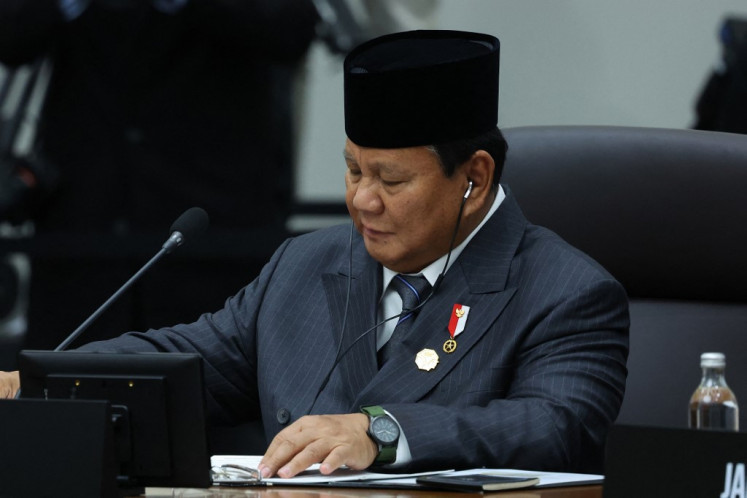Popular Reads
Top Results
Can't find what you're looking for?
View all search resultsPopular Reads
Top Results
Can't find what you're looking for?
View all search resultsChina welcomes ASEAN’s Indo-Pacific
Beijing is welcoming ASEAN’s concept of the Indo-Pacific but is yet to endorse the concept as a result of its skepticism toward the bloc’s slow drive on regional integration
Change text size
Gift Premium Articles
to Anyone
B
eijing is welcoming ASEAN’s concept of the Indo-Pacific but is yet to endorse the concept as a result of its skepticism toward the bloc’s slow drive on regional integration.
A diplomat at the Chinese Mission to ASEAN, requesting to remain anonymous, told The Jakarta Post that the Indo-Pacific concept, initially developed by Indonesia, was more constructive than those of the United States and Japan. It, most importantly, did not seem to contain Beijing, the source said.
Nonetheless, the source said Beijing would unlikely announce its position on the matter in the near future as there was no concrete cooperation yet.
For now, China would keep its eyes on the deliberation of the Indo-Pacific at ASEAN level and see what the regional bloc would do about it, he said at a media gathering recently.
While other Indo-Pacific concepts, such as the US’ Indo-Pacific Strategy, are said to restrain Beijing’s state-led trillion dollar Belt and Road Initiative, Jakarta’s notion, which is set to be adopted by ASEAN in 2019, is distinctive with its main principles of openness, inclusivity, transparency, in accordance with international law, and based on ASEAN centrality.
Showing an antithesis to the US strategy, President Joko “Jokowi” Widodo asked Chinese Prime Minister Li Keqiang to join ASEAN’s initiative at the 33rd ASEAN Summit in Singapore in November.
Contacted separately, Christine Susanna Tjhin, a researcher at the Centre for Strategic and International Studies (CSIS), echoed the source, saying that Jakarta’s concept had drawn positive responses from Chinese officials and experts.
“Principally, Beijing feels that Indonesia’s concept is the most constructive one and does not contain China,” she told the Post.
“Yet, since there are no concrete offers from the initiative yet, Beijing is not to declare its commitment and decided to watch the process at ASEAN level.”
She added that Beijing did not mind joining the initiative, including its ASEAN-centered principle, as well as the plan of using an existing cooperation, such as the East Asia Summit.
“As long as the cooperation is constructive, China does not mind joining. Realistically, China has more capacity to participate, like funds and human sources,” she said, adding that Beijing still believed in multilateralism as an essential diplomatic strategy.
Nonetheless, Beijing was skeptical about how ASEAN could develop and realize the Indo-Pacific concept in the region, she added.
She said Beijing doubted ASEAN’s effectiveness in organizing and driving the regional integration process.
“Among all three ASEAN pillars, the most effective one is economy, but experiences show that ASEAN’s process of concluding negotiations is quite slow, particularly when it involves many countries, like the RCEP,” she said, referring to the Regional Comprehensive Economic Partnership.
She said that the RCEP, involving 10 ASEAN member countries plus China, India, Japan, South Korea, Australia and New Zealand, had been in negotiation for six years but was still far from conclusion.
At initial RCEP discussions, China felt that ASEAN would be better as the driver but observing the slow process in the RCEP and many negotiations, Beijing began to doubt the Indo-Pacific initiative.
Apart from the Indo-Pacific concept, the Chinese source also revealed Beijing’s optimism over the negotiation progress for the South China Sea Code of Conduct.
Echoing Chinese President Xi Jinping, the diplomat said Beijing aimed to finish the negotiation within three years as it and the ASEAN member states had reached a mutual understanding, likely allowing the progress to accelerate.
Previously, the negotiations were tough because the stakeholders still had misunderstandings with each other, he said.










